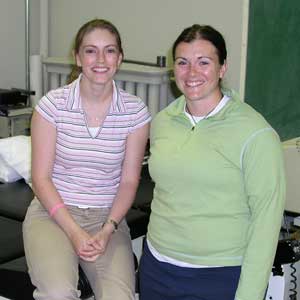 |
| Physiotherapy students Josee Boulay and Christie Cameron |
"So, what did you do last summer?"
It«s a question that will be repeated a thousand times as new and returning students arrive on campus. Dalhousie News caught up with a few students who spent the last few months right here, contributing their talents as teachers and research assistants.
Julia Cudmore from St. John, NB, shared the skills she«s gained through the acting program in the Theatre Department with kids participating in Dalhousie«s mini university. Working with kids from age eight to 14 in four one-week sessions, this fourth year student was responsible for developing a curriculum to teach young scholars about theatre basics, improvisation, voice and movement, and what it takes to portray a character on stage.
Cudmore says that the highlight of her summer was seeing kids build new confidence. "Many of the kids were more interested in science, and didn«t want to be on stage, but by the end of the week, they were comfortable enough to perform and learned that theatre is a lot of fun. For me, that«s the most rewarding experience," she notes.
She also says that her teaching experience has provided many insights that will help develop her own craft. "When you«re acting, it«s about immediate reactions. Children are the best example of that-if you have a disagreement with a kid, five minutes later it«s forgotten because it«s not «right now.« When you«re on stage, it«s about right now. Working with children has greatly changed the way I look at acting."
Josee Boulay and Christie Cameron were busy in the lab this summer. These physiotherapy students are both entering their third year, and worked as research assistants for Dr. Marilyn MacKay-Lyons and Dr. Cheryl Kozey on several projects.
In particular, Boulay and Cameron are working together on an ongoing project to analyze how people with low back pain use their abdominal and back muscles, which may point to new rehabilitation methods. The two are responsible for interviewing possible study participants, as well as seeing them through the different stages of the study.
Both students say working on this research has given them valuable experience they«ll use in their careers. "We«re getting practice in dealing with people, like we would in a clinic. We«re learning how to explain things, and talk to a client, and also how to work with the client«s muscles," says Boulay.
Cameron agrees, adding that this summer job has helped her keep current on the knowledge she«ll need in the coming year. "By using my knowledge over the summer, it means I don«t lose it, and I won«t have to refresh everything when I go back to class," she says.
These two students will continue working on the trunk muscle study throughout the year, while engaging in other research projects looking at rehabilitation after stroke, and the factors that may contribute to osteoarthritis in knee-replacement patients.
NSERC summer student Joel St. Aubin was busy working on a research project with the Department of Physics and Atmospheric Science, to gain experience for graduate studies and a career in medical physics. Originally from Calgary, AB, and entering his fourth year, St. Aubin is working with Dr. Kevin Hewitt to find a new diagnostic method for sickle cell anemia.
Sickle cell anemia occurs when a certain concentration of haemoglobin in the blood is altered by an amino acid, and takes on an irregular sickle shape. Because of this, the haemoglobin molecules can form long chains, and prevent oxygen from reaching parts of the body, causing pain in those affected by this blood disorder. "What we«re trying to do is create an accurate and quick diagnostic method for sickle cell anemia," says St. Aubin.
The project seeks to use Raman scattering, a type of spectroscopy, to identify irregular haemoglobin cells. "Hopefully, this is something that will be used in diagnostic labs throughout Canada. We just started this summer, but we«ve already achieved some promising results," he says. "It«s a complicated process, but once we know how to do it, it could allow someone to diagnose the disease in 30 seconds."
St. Aubin also says that making research his summer job will give him a leg up when it comes to graduate studies. "Doing research as an undergrad opens your eyes. Being in this setting, seeing the results and failures, you can see what research is really about. It«s helped to train me for the kind of work I«ll do as a graduate student."
EDITOR«S NOTE: Thanks and best wishes to Kristen Loyst, a regular contributer to Dalhousie News who is leaving to embark on a new position.
